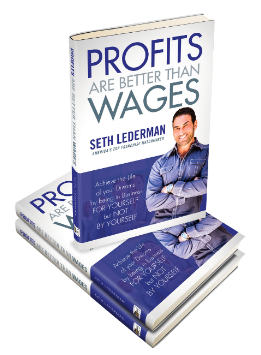Affordable Franchises for Your Budget: A Buyers’ Guide
 by Seth Lederman
by Seth Lederman
Indeed, many of the most well-known franchises, particularly fast-food ones such as McDonald’s or Subway, may be out of reach for many thanks to price tags that can reach into the millions, but that doesn’t mean there aren’t other options that are more in line with your budget.

Have you dreamed of being your own boss, running your own business, and achieving long-term financial stability? Then you may have considered the possibility of owning a franchise, but maybe you never really investigated it because you assumed franchises were too expensive for your budget. Indeed, many of the most well-known franchises, particularly fast-food ones such as McDonald’s or Subway, may be out of reach for many thanks to price tags that can reach into the millions, but that doesn’t mean there aren’t other options that are more in line with your budget.
Lower costs don’t limit your choices.

For too long, too many people have operated under the assumption that the more money they spend on a franchise, the more money it will make them. Certainly, large franchise operations earn a lot, but they also carry significant overhead. So, the top-line revenue may be impressive for a large, well-known brand name franchise, but the bottom-line profits may be less so.
What’s more important to consider then? Value. Think about how much weight you place on a smaller financial outlay for a low-cost franchise — from the lowered risk to the reduced demands on your time, energy, and family life. And don’t forget, a more economical franchise offers lower overhead, meaning much more of the money you make translates directly to profit.
Vending

One of the more affordable and convenient franchise options is vending machines. Today just about anything you want can be dispensed from a vending machine, from the traditional beverages and snacks to personal hygiene items and DVDs. Vending machines in the U.S. were estimated to earn $36.5 billion in 2020. Not only are vending machines profitable, but purchasing one is quite affordable, with some priced under $20,000.
Vending machines can be a great way to start as a franchisee. But it would help if you remember certain things. For instance, location is essential for any business. It is simply crucial for vending machines. If your machine is not placed well, you will not achieve the revenue you want or need. Also, to be successful with a vending machine requires staying on top of reloading stock and what consumers want.
Successful vending entrepreneurs continually monitor sales, test new products, and stay on the lookout for recent profitable locations. While it might be tempting to consider a vending franchise as one that you can “set it and forget it,” the growth-minded franchisee is always alert and attentive to their customers and their machines.
Kiosks and Carts

Ever passed by a kiosk in a mall or airport concourse and wondered about the people running it? They are most likely entrepreneurs like you, but with a particular personality. It takes stamina and an out-going personality to turn this low-cost franchise concept into a thriving reflection of your entrepreneurial drive. You must be willing to put on a bit of a show — from making eye contact with passersby to engaging them in conversation to attract them into buying. Of course, smiling and maybe even offering up a little sample of the merchandise or inviting them to examine your products doesn’t hurt either.
Whether you opt for a cart or a kiosk — kiosks are larger, enclosed, and give you a place to sit — both concepts need a great location. Whether you sell popcorn, snacks, sandwiches, sunglasses, gifts, or something else, you must be where the customers are. Kiosks and carts are typically found in high-traffic areas, but should the need arise, the great thing about this type of franchise is its mobility. If you need to move to follow the crowds, pack up your cart and find them.
Home-Based

We’ve all spent more time in our homes of late, but the great thing about that is more and more people realize that their home can also be their place of work. And that is where a home-based franchise fits in nicely. There are a lot of home-based opportunities available — tutoring, business consulting, cleaning services, pet care, repair services, in-home senior care, internet-focused and more. It won’t be hard to find a business that fits your skillset and background.
One challenge that does come with a home-based franchise is discipline. Because you don’t have a commute and won’t have set hours when the doors will have to be open for customers, you will have to create a routine and stick to it. While it can be tempting to sleep late, lounge in front of the TV, and take days off, if you opt for a home-based franchise, you must learn to manage your time and stay focused if you are to be successful.
However, not all home-based businesses keep you indoors all day. Sure, you may not have an office or retail space to visit, but if your franchise is lawn maintenance or car detailing franchise, for instance, you may still need to reach out to service customers and prospects for the business.
Learn the many benefits of a low-cost franchise.
Those with less money to invest are perhaps the most apparent entrepreneurs to benefit from a low-cost franchise. But they aren’t the only investors who can or should seize on what an affordable franchise can offer.
For instance, anyone lacking in business experience will find that an inexpensive franchise provides them with an excellent opportunity to learn the ins and outs of the business world. Another group that may find this type of franchise the ideal way to dip their toe into business is the risk-averse. Finally, because low-cost franchises require a reduced financial commitment, they appeal to a much broader group of people — young adults, minorities, single parents, retired people — anyone with the entrepreneurial spirit but who lacks access to many of the resources more established businesspeople can access.
Even though the financial cost with an affordable franchise is less, the benefits of owning a franchise remain significant. Unlike starting a business on your own, buying into a franchise system provides you with valuable support, from training to marketing to providing necessary supplies — all of which significantly reduce your responsibilities as a franchisee while improving your odds of success.
Even with these multiple benefits, success for any franchisee is never guaranteed. However, because a low-cost franchise comes with lower risks and overhead, it is not uncommon for a franchise to experience profits faster than they might with a more expensive franchise. A larger, more expensive franchise operation may encounter challenges, such as cash flow issues or the need for substantial operating capital, which are not issues for a more affordable franchise option.
Finally, because an affordable franchise comes with fewer moving parts, it can be easier to manage, making it attractive for entrepreneurs who don’t want to sacrifice work/life balance.
But that doesn’t mean that this franchise investment is without risks.
An affordable franchise offers a reduced potential for return. Yes, the margins may be as good or better than another more extensive and more costly franchise, but those margins are coming from a much smaller till thanks to less traffic and less potential to generate revenue.
There can also be an issue with brand awareness. A larger, more well-known franchise benefits from connecting to a distinguished brand name. A small franchise, in many cases, is relatively unknown. Not having a retail storefront may also hinder you in building brand awareness in your community. This all translates to additional work you will have to do to gain a reputation and earn customer loyalty.
Another drawback of a low-cost franchise is the competition. Because they are accessible to more people, more people are interested. That is why it’s essential to thoroughly examine your business’s intended market when investigating potential franchises. Is it already being served by a similar business? Is there growth potential? Researching the company behind the franchise, but so is understanding the competitive landscape you face.
Finally, remember some advantages to high-cost franchises despite the additional demands they place on owners. An important one is buying power. More extensive franchises can purchase supplies, products, and materials at more favorable prices thanks to their scale. If your affordable franchise is directly competing with a more prominent franchise, it may be harder to compete on price.
As mentioned earlier, self-motivation is essential with a low-cost franchise. With no storefront, no publicized hours of operation, and no staff of employees depending on your presence and engagement, you must stay focused to succeed.
How to pick the right budget-friendly franchise for you?
It makes sense to consider a franchise based on your interest. After all, you want to be enthusiastic about your business, and enjoying what you do is likely to keep you dedicated and devoted. However, some people mistake focusing only on what they are passionate about. When emotion overrides reason, you could end up investing in a franchise concept that isn’t the best choice for your long-term success. You may love golf but being tied to a mall kiosk all day that sells golf equipment doesn’t feed that love of the game, and it is very likely to lead to failure.
Research Performance

Give your dream of owning your own business its best shot at success by researching the growth rate of your business. Review its history, whether it’s a few years or decades. Be sure you have a clear understanding of how the franchise has performed. If an idea is untested and unproven, you may not want to take that risk.
Due Diligence

The more due diligence you do, the greater your odds for success. Pay particular attention to item 21 detailing the franchise’s financials in the Franchise Disclosure Document. A solid and healthy company will generally derive a greater percentage of its income from royalties instead of franchise fees. Item 20 is also revealing. Pay attention to the number of units opened in the past three years, how many have closed and if those were taken over by corporate. Be detailed with your research. Reach out to both franchisees and the franchisor for answers to your questions.
Scrutiny

Take your research seriously. Before you sign on, you need to know the following: what the prospective yield of the franchise is, its growth rate, the history of the business, and the market potential for your region. Now is not the time to be emotional. Every aspect of the franchise opportunity needs to be viewed with dispassionate scrutiny. Only after doing in-depth research can you be confident that a low-cost franchise is right for you.
How can you be sure that you are finding a franchise that is the perfect fit? Start with a list. Write down all your interests and skills on one side, with all the low-cost franchise opportunities that seem relevant to those areas on the other. This is not about evaluating the options. You are simply making lists to help you eliminate opportunities based on your interests and skills.
If some of your opportunities are home-based, you will want to check the regulations in your area to determine whether a home-based option is feasible for you. If your home doesn’t meet regulations for any reason, you will need to move on from those options.
Next, look at the financial investment involved. Those franchises can be crossed off if an option is clearly outside your budget. There are finance options available which we will discuss later in this guide. But even with financing, you should have a budget in mind that you are comfortable with and need to stay within.
Finally, consider the product or service. Does it have a history of customer interest that proves it’s not a fad? Think about the franchisor. What is its reputation? If any options are listed that throw up red flags, they can be eliminated.
Take a fresh look at your list. With what remains, ask yourself honestly if you have the skills and resources necessary to succeed at the franchise opportunities that are still listed. When you talk to the franchisor and other franchisees about the skills needed, can you honestly say you possess those skills? If you don’t, no amount of passion or interest is likely to help you succeed. Indeed, you can learn certain skills, but that demands a learning curve. How will that time impact you financially?
Now you should have reduced your list to a handful of opportunities, each a potentially perfect fit for your interests, skills, and budget. Next, consider how each fits in your market. Will you have competitors? Will your product or service stand apart from them?
So long as you have been honest in creating your list, it should contain only those franchise opportunities with the greatest potential for success. The final decision will hinge on a few factors: Do you like the franchisor? In general, it’s a good idea to get along with someone you are going into business with. Any personality clashes or severe differences of opinion during your discussions should be warning signs to look elsewhere.
Finally, how has the franchise you’re interested in performed historically? The Franchise Disclosure Document sent to you by the franchisor will give you this information. Current franchisees can be another source. Talk to as many as you can — especially any operating in markets like yours. This will give you an honest assessment of what you can expect before investing your money.
Details of your investment.
A significant advantage of an affordable franchise is it requires no real estate. Removing that component allows for a much lower cost of entry. But you will still have start-up costs and ongoing fees, which can vary greatly from one franchise to the next. Make sure you have a clear picture of all that is expected of you financially.
You need to know the initial costs and what you’re responsible for each month. Pay close attention to the information contained in the Franchise Disclosure Document. If you have questions, don’t hesitate to talk to the franchisor to clarify any figures you don’t understand. And again, fellow franchisees can be an excellent resource for firsthand accounts.
To compare one opportunity to another, focus on two numbers:
Initial Fees
Called a “franchise fee,” this is what you pay when you buy into a franchise. This is the cost of entering the franchise system. Generally, you pay a flat rate to the franchisor when you sign a franchise agreement.
Ongoing Fees
Recurring and occasional fees, including royalties, are required by almost all franchisors in return for their continuing support. Usually, royalty fees are a percentage of sales. Some companies may charge a flat fee weekly, monthly or yearly basis.
For those not in a position to self-finance the purchase of their low-cost franchise, financing options do exist. Some people may even access financial support from a family member or borrow from their own 401(k) accounts, which is permitted for business start-ups. This includes traditional bank loans — if you have good credit and collateral — although it’s usually wise to investigate a Small Business Administration (SBA) loan, which can offer better terms. But start with the franchisor. They may offer financing at even more attractive terms than any other source. Options exist to finance your dream; all it takes is some research to determine the best choice for you.
Franchise Buyers’ Checklist
Investing in a franchise, even a low-cost franchise, is still a significant expenditure that requires thorough due diligence. When you are serious about finding the right franchise for you, low-cost or otherwise, doing your homework is essential. It’s also the best way to ensure you maximize your success odds.
This checklist will help keep you on track.

- Learn all you can about the low-cost franchise concept you are considering. Determine if the business is healthy, profitable, and experiencing growth.
- Find out how long the franchisor has been in business. Item 21 in the Franchise Disclosure Document indicates the franchisor’s financial health. Ask about anything that looks out of the ordinary.
- Determine all the franchise’s locations, how many there are, where they are, which have failed, and when.
- Know the competitive landscape. Are there similar businesses in your desired location you will be up against? Are you vulnerable to new players?
- Understand your customer base. How big is it? How close are they to your desired location? If you’re a kiosk/cart, where are you most likely to find your customers gathering?
- Talk to franchisees — as many as you can. Look for franchisees who match your personality, your situation, your location.
- Be honest about your financing options and your capital needs. Can you self-finance? Do you qualify for SBA or other loans? Does the franchisor offer to finance? Do banks accredit it?
- Compare the franchises you are considering based on their levels of support, culture, royalties, and reputation.
- Study the Franchise Disclosure Document. Talk through any section or point that you don’t understand or spelled out to your satisfaction. Never assume something.
- Get specific answers from the franchisor about how much training, support, and continuing education is offered.
Next steps.
For those who dream of owning their own business, investing in an affordable franchise represents the chance to control your destiny and financial future. Entrepreneurial dreams aren’t only for those with deep pockets or lots of business experience. Thanks to low-cost franchise options, there’s a world of possibilities for all manner of people to explore so they can realize their business ownership dreams. It’s just a matter of researching to find the best opportunity for you. Take the next step and start exploring!
Let Frannexus Be Your Guide!

If you are considering investing in a franchise, don’t take the chance of choosing the wrong one and not achieving your goals. Learn from the experience of others in the franchise field, like a franchise coach, to have the greatest likelihood not just of succeeding but exceeding what you think is possible. At Frannexus, we have the expertise, knowledge, and experience to help you achieve your financial and personal goals. The right match is waiting for you, and Frannexus is the matchmaker to find your franchise soulmate.
DISCOVER A BETTER WAY TO EARN WHILE LIVING
Profits are Better Than Wages

In “Profits are Better Than Wages”, experienced franchise advisor, Seth Lederman answers the “how” and “why” of going into business for yourself.
Get the News that Franchise Investors Want
Sign-up for FranBlog
Sign-up for occasional updates on the latest opportunities in franchising



CONTACT THE EXPERIENCED ADVISORS AT FRANNEXUS
Your franchise search just got easier with Frannexus
NO COST TO YOU
OUR FEES ARE PAID BY THE FRANCHISE BRANDS

